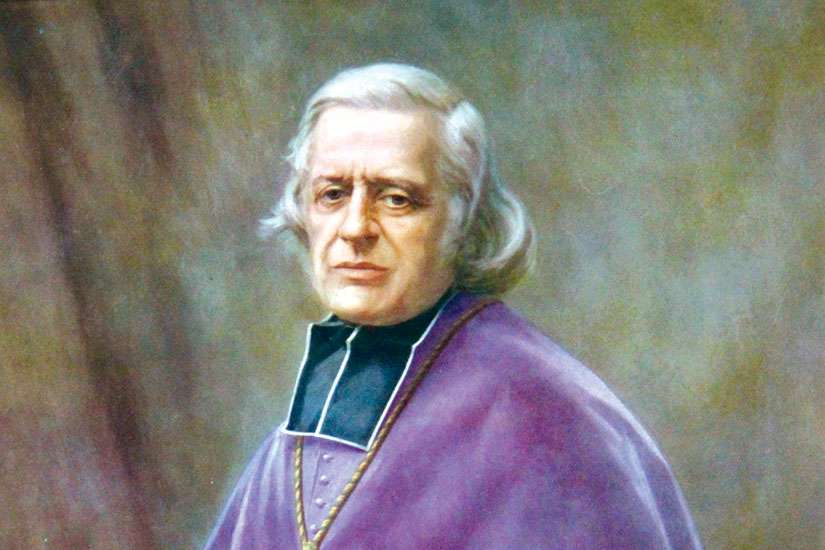Eugene enjoyed all that the aristocratic lifestyle offered, filled with wealth and comforts of every kind. A rather predominant, prosperous and powerful position awaited him in adult life.
But this idyllic life ended with the upheaval of the French Revolution in 1789. Due to his father’s open opposition to the revolution and noble status, the entire family was compelled to flee to neighbouring Italy.
The de Mazenod family, political refugees, were forced to move multiple times and stayed periodically in Turin, Venice, Naples and Palermo. His father tried his hand at trade to support his family but proved to be a poor merchant. The family came close to destitution and endured many hardships. Moving to Turin, he studied briefly at the College of Nobles, but that quickly ended with a move to Venice. Some time later, a compassionate priest, Fr. Don Bartolo Zinelli, who lived nearby, committed to educating the young French adolescent.
Zinelli gave de Mazenod a fundamental education but, more important, gave him a constant sense of God and a regimen of piety. He laid out the imperative spiritual foundations and lessons which were planted deep in de Mazenod’s heart and would stay with him for the rest of his life.
The young student learned and deepened his understanding of prayer and self-mortification.
Zinelli introduced him to the devotion to the Blessed Virgin Mary. “It was there,” de Mazenod would write, “that my vocation to the priesthood was born.”
The family continued to travel and moved to Naples and later to Palermo where, thanks to the hospitality of the Duke and Duchess of Cannizzaro, de Mazenod had his first real taste of the upper-class lifestyle. He called himself “Count” de Mazenod and looked forward to a bright future.
In 1820, when de Mazenod was 20, it was finally safe to return to France. But to his surprise he was now viewed as an ordinary citizen without a title. His mother intended to marry him off to the richest heiress she could find. The dreams of a prestigious position in society, marriage and wealth quickly faded after the death of his mother, leaving the 25-year-old in a state of depression.
Slowly, the spiritual lessons gained in Venice began to manifest themselves. The sight of moral decadence and poverty that took over the country after the revolution had a profound impact on de Mazenod. It was at this time he experienced two special graces.
The first and relatively infamous one was the grace of conversion on a Good Friday during adoration of the cross. Looking at the cross, de Mazenod gained a deeper understanding of Christ’s love and goodness. The cross, a reminder of the shedding of Christ’s blood to obtain the forgiveness of all sins, was seen as a culmination of Gods mercy and forgiveness. With an absolute confidence in His infinite mercy, de Mazenod grew conscious of his sins and decided to give his life up to Jesus Christ.
The second grace was his decision to become a priest. He entered the Seminary of Saint- Sulpice in Paris in 1808 and was ordained a priest at Amiens in 1811. His dream was to be “the servant and priest of the poor.”
With the approval of his bishop, de Mazenod avoided a prestigious diocesan position and instead reached out to the poorest and most marginalized people of Aix.
Overwhelmed, he sought out other equally zealous priests who were prepared to step outside the old, even outmoded, boundaries of priesthood. On Jan. 25, 1816 the Society of the Missionaries of Provence was born.
De Mazenod invited his brother priests to live in community and “imitate the virtues and examples of our Saviour Jesus Christ, above all through the preaching of the word of God to the poor.” Pope Leo XII on Feb. 17, 1826 formally approved the newly founded congregation, now called the Missionary Oblates of Mary Immaculate.
De Mazenod was elected Superior General and continued to inspire and guide his men for 35 years, until his death.
The newly founded Oblates worked with youth and immigrants, took care of shrines, engaged in prison chaplaincy and became directors of seminaries.
The “glory of God, the good of the Church and the sanctification of souls,” de Mazenod writes, were impelling forces for the Oblates.
Amid all this, in 1832, de Mazenod was named auxiliary bishop of Marseilles, with his episcopal ordination taking place in Rome. The greatest challenge was now rebuilding the post-revolutionary diocese. De Mazenod always maintained a close presence among his people. He was famous for speaking patois, the dialect of the people, instead of the more aristocratic French, as the poor did not understand it. Even as an archbishop of a major diocese he would continue regular pastoral visits to the backstreet slums of Marseilles, joke with the fishwives in the open air markets, and held open office hours every morning. He was a true shepherd of his people.
His zeal for the Kingdom of God and his devotion to the Church resulted in Oblates being sent all around the world. A prolific writer, de Mazenod corresponded unceasingly with his missionaries and was called a “second Paul.” He emphasized that all children of God were called to salvation and holiness and, furthermore, the journey to sainthood demanded a constant and ongoing conversion. To love Jesus Christ, he said, is to love the Church.
His last words to the Oblates summed up his life: “Practice well among yourselves charity, charity, charity, and outside, zeal for the salvation of souls.”
Bishop Eugene de Mazenod died May 21, 1861. He was canonized by St. Pope John Paul II, Dec. 3, 1995 in Rome.


